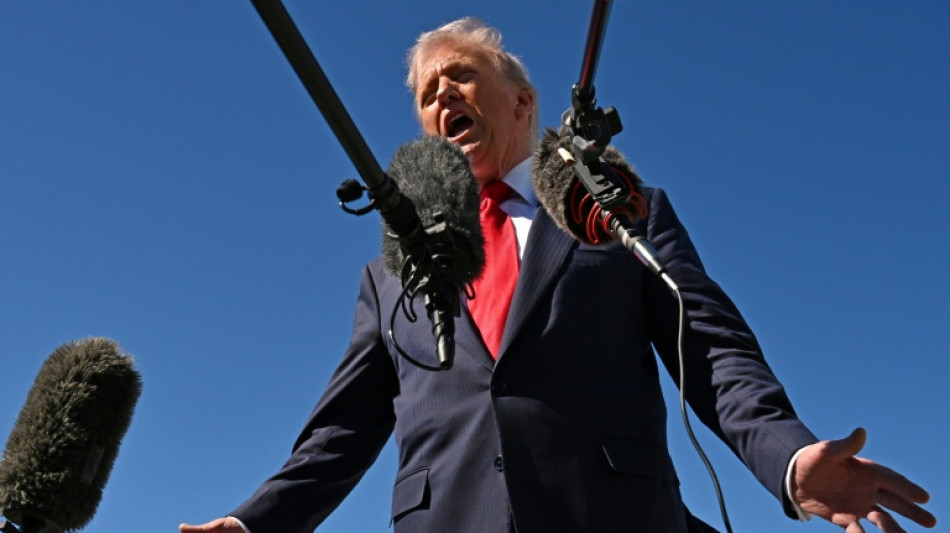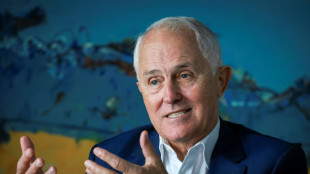
US government shutdown becomes longest in history

The US government shutdown became the longest ever Wednesday, topping the 35-day record set during Donald Trump's first term, as his administration warned of holiday air travel chaos and threatened Americans' benefits in a bid to force a resolution.
Federal agencies have been grinding to a halt since Congress failed to approve funding past September 30, and the pain has been mounting as welfare programs -- including aid that helps millions of Americans afford groceries -- hang in limbo.
There were in recent days the first fragile signs of progress in Congress in the search for an off-ramp, although -- for now -- 1.4 million federal workers, from air traffic controllers to park wardens, remain on enforced leave or working without pay.
Hours before the shutdown record toppled at midnight, the Trump administration sounded the alarm over turmoil at airports nationwide if the crisis drags beyond a sixth week, with worsening staff shortages snarling airports and closing down sections of airspace.
"So if you bring us to a week from today, Democrats, you will see mass chaos...you will see mass flight delays," Transportation Secretary Sean Duffy told a news conference in Philadelphia.
"You'll see mass cancellations, and you may see us close certain parts of the airspace, because we just cannot manage it because we don't have the air traffic controllers."
Thanksgiving air travel is expected to set a new record this year, the American Automobile Association (AAA) projected -- with 5.8 million people set to fly domestically over the November 27 holiday.
More than 60,000 air traffic controllers and Transportation Security Administration (TSA) officers are working without pay, and the White House has warned that increased absenteeism could mean chaos at check-in lines.
Airport workers calling in sick rather than working without pay -- leading to significant delays -- was a major factor in Trump bringing an end to the 2019 shutdown.
Both Democrats and Republicans remain unwavering however over the main sticking point in the current stoppage -- health care spending.
- 'Defiance' -
Democrats say they will only provide votes to end the funding lapse after a deal has been struck to extend expiring insurance subsidies that make health care affordable for millions of Americans.
But Republicans insist they will only address health care once Democrats have voted to switch the lights back on in Washington.
While both sides' leadership have shown little appetite for compromise, there have been signs of life on the back benches, with a handful of moderate Democrats working to find an escape hatch.
A separate bipartisan group of four centrist House members unveiled a compromise framework Monday for lowering health insurance costs.
Democrats believe that millions of Americans seeing skyrocketing premiums as they enroll into health insurance programs for next year will pressure Republicans into seeking compromise.
But Trump has held firm on refusing to negotiate, telling CBS News in an interview broadcast Sunday that he would "not be extorted."
The president has sought to apply his own pressure to force Democrats to cave by threatening mass layoffs of federal workers and using the shutdown to target progressive priorities.
Trump on Tuesday repeated his administration's threat to cut off a vital aid program that helps 42 million Americans pay for groceries for the first time in its more than 60-year history, even though the move was blocked by two courts.
The White House later clarified, however, that it was "fully complying" with its legal obligations and was working to get partial SNAP payments "out the door as much as we can and as quickly as we can."
A.Imbrogno--INP

 London
London

 Manchester
Manchester
 Glasgow
Glasgow
 Dublin
Dublin
 Belfast
Belfast
 Washington
Washington
 Denver
Denver
 Atlanta
Atlanta
 Dallas
Dallas
 Houston Texas
Houston Texas
 New Orleans
New Orleans
 El Paso
El Paso
 Phoenix
Phoenix
 Los Angeles
Los Angeles



